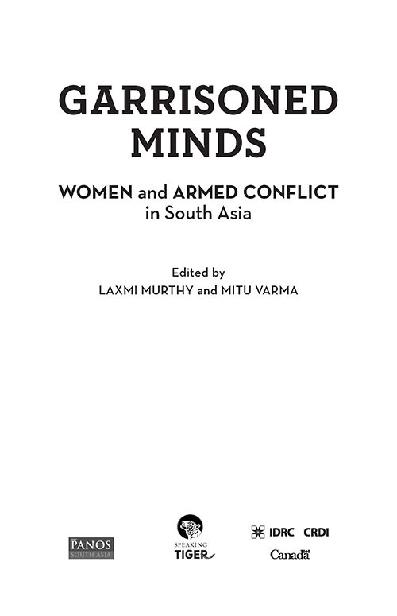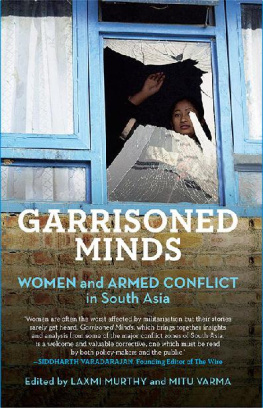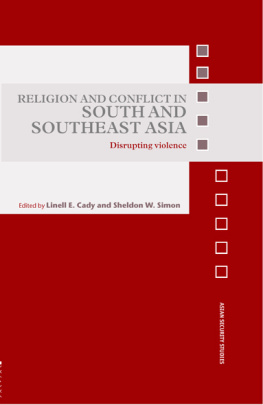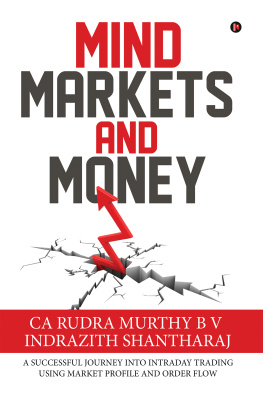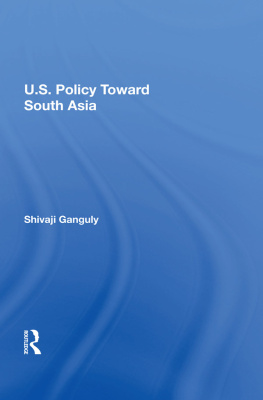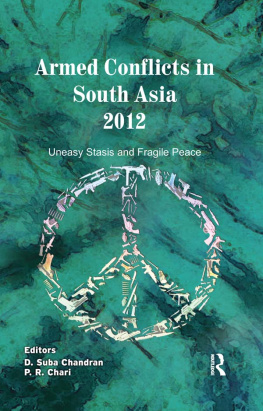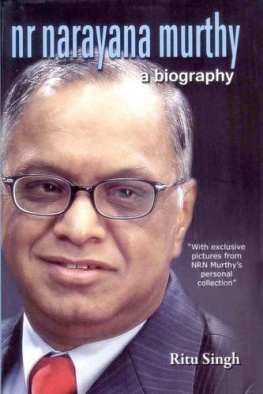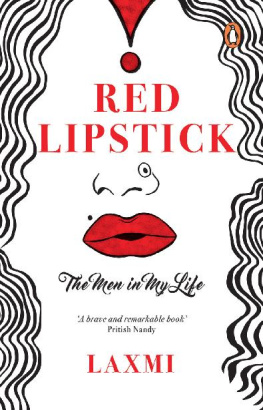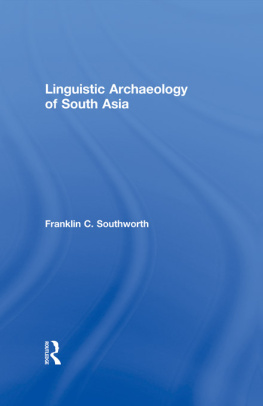About the Authors
Laxmi Murthy is consulting editor with Himal Southasian , the regions only political review magazine, published from Kathmandu. She also heads the Hri Institute for Southasian Research and Exchange, a research unit under the Himal banner. She is currently based in Bangalore and has been active in the autonomous womens movement in India for more than twenty-five years.
Mitu Varma is project director at Panos South Asia and has been leading the project on which this book is based. She is also director for Film Southasia, a biennial festival of documentaries for the region, and editorial advisor for Himal Southasian . She is based in New Delhi and is a founder member of the Community Radio ForumIndia.
Zahid Hussain is an award-winning journalist and author. He is the former Pakistan correspondent for The Times of London and The Wall Street Journal . He has also covered Pakistan and Afghanistan for several other international publications, including Newsweek , Associated Press, The Economist and India Today . He is a regular columnist for Dawn .
Farzana Ali is the Peshawar bureau chief of Aaj News, a private television channel. She covers Khyber Pakhtunkhwa and the Tribal Areas. Her areas of interest include social issues and human rights, and as a journalist from a war zone, most of her work is related to conflict. She has produced four documentaries on different issues with national and international organisations, including Impact of Militarisation on the Dancing Girls of Swat for Panos.
Muhammad Zafar is a reporter with the Express Tribune, an international newspaper in Quetta. He covers court proceedings, politics, crime, sports and health across Balochistan. He has also worked for the Media Times, Daily Times and Daily Balochistan Express.
Shazia Irram Gul has been working as a correspondent with Radio Pakistan, Peshawar since 2000. As head of the Peshawar University Media Research Centre, she helped set up and manage the first University Campus Radio in any university of Pakistan-Khyber Pakhtunkhwa. She has also worked with Deutsche Welle Urdu service. She has led teams covering the 2005 quake in the region and the 2010 floods in Swat for mainstream media.
Syed Ali Shah is the Balochistan Bureau Chief of Dawn News based in Quetta. He has been reporting on social issues, politics, growing religious radicalisation, sectarianism, the Baloch insurgency, tribal disputes and the menace of narcotics in the province for the past fifteen years. He has earlier worked with Al Jazeera and The Balochistan Times and contributed stories to CNN as well.
Shaista Yasmeen is currently working as a Project Coordinator at Uks Research Resource and Publication Centre in Pakistan. She combines the experiences gained from media and social development sectors to conduct trainings, produce radio shows, write articles and deliver lectures. She has earlier worked with Dawn TV, AVT Group of Channels, and Pakistan Broadcasting Corporation and contributes monthly articles to Sach Web TV. Her areas of interest include politics, current affairs, media, gender and human rights .
Deepak Thapa is the Director of Social Science Baha, Kathmandu. He has commented extensively on Nepals contemporary political developments and writes a fortnightly column in The Kathmandu Post . He is also a widely published author on socio-political issues in Nepal.
Darshan Karki has been a journalist and editor at The Kathmandu Post . Before joining the newsroom, she worked as a researcher in various non-governmental organisations in Nepal.
Deepak Adhikari is a Kathmandu-based independent journalist. In a career spanning over a decade-and-a-half, he has covered many of the socio-political issues of Nepal including human rights, the environment, hydropower, tourism, and mountaineering. His work has appeared in the New York Times , Time magazine, The Caravan , Himal Southasian , Al Jazeera , and the Nikkei Asian Review , among others. He has also served as the Nepal correspondent for Agence France-Presse (AFP), the global news agency. Prior to joining AFP, he was with Nepals largest media group, Kantipur Publications.
Sewa Bhattarai is currently a reporter at BBC Nepali Sewa, where she reports on the art beat in Nepali language. A bilingual journalist, she has previously worked with Republica , an English language daily in Nepal, and continues to write for several English-language publications. Her interests in reporting are art, culture, religion, gender, society and environment.
Siddiq Wahid is a historian of Central Eurasian and Tibetan political history and the Founding Vice Chancellor of Islamic University in Kashmir. Among his previous assignments, he has been Senior Fellow at New Delhis prestigious Centre for Policy Research, Director of the UNESCO Institute of Kashmir Studies at the University of Kashmir and the Maharaja Gulab Singh Chair Professor at the University of Jammu. Wahid received his PhD from Harvard University and has lectured widely in the United States, Europe and South Asia. He has published in many anthologies and journals. He has also written widely as a public intellectual on the Kashmir dispute, for the resolution of which he is an activist.
Shazia Yousuf was born in downtown Srinagar, the summer capital of Indian-administered Kashmir. She grew up amidst armed conflict and decided to become a story-teller. After a Masters in Journalism, she joined a local newsmagazine, Kashmir Life , and also wrote stories of women in war zones for many international, national and local media outlets including Guernica , Inter Press Service, Womens Feature Service, and Anadolu Agency. She also teaches at the Islamic University of Science and Technology.
Zahid Rafiq is a journalist based in Srinagar. He has worked with The Indian Express , Tehelka and The Hindu . A Fulbright scholar, he studied journalism at the University of California, Berkeley, and has written for several international publications like the New York Times , Christian Science Monitor , Foreign Policy and Vice News .
Sanjay Barbora is a sociologist who teaches at the Tata Institute of Social Sciences, Guwahati Campus. He has worked with Panos South Asia in the past and is involved with several research initiatives on migration, agrarian change and the media.
Thingnam Anjulika Samom is an independent journalist based in Manipur. She has been associated with leading newspapers in Manipur such as Matamgi Yakairol , Sangai Express and Hueiyen Lanpao , besides writing for agencies and publications based outside such as the North East Sun , Womens Feature Services (WFS), Himal Southasian , Infochange, Indiatogether, Motherland , The Caravan and Panos London Features. She has also made two short films on conflict widows in Manipur besides translating stories and poems from Manipuri to English.
Yirmiyan Arthur Yhome has had a long association with Panos South Asia. This Road I Know is her third documentary completed with the help of a Panos fellowship. She holds a Masters degree from the Mass Communication Research Centre, Jamia Millia Islamia. She is a Photo Editor with the Associated Press.
GARRISONED MINDS
Contents
Mitu Varma
IntroductionGarrisoned Minds:
Women and Militarisation in South Asia
Laxmi Murthy
Zahid Hussain
Shazia Irram Gul
Farzana Ali
Syed Ali Shah and Shaista Yasmeen
Muhammad Zafar

